英语专业四级反义疑问句全面讲解
反义疑问句讲解及答案
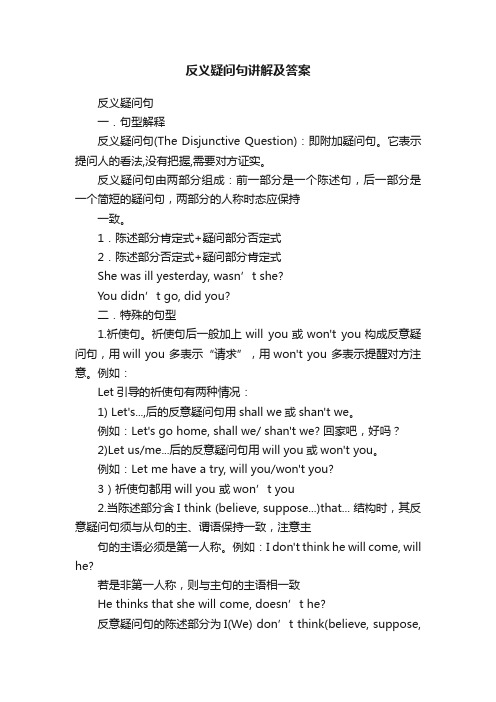
反义疑问句讲解及答案反义疑问句一.句型解释反义疑问句(The Disjunctive Question):即附加疑问句。
它表示提问人的看法,没有把握,需要对方证实。
反义疑问句由两部分组成:前一部分是一个陈述句,后一部分是一个简短的疑问句,两部分的人称时态应保持一致。
1.陈述部分肯定式+疑问部分否定式2.陈述部分否定式+疑问部分肯定式She was ill yesterday, wasn’t she?You didn’t go, did you?二.特殊的句型1.祈使句。
祈使句后一般加上will you或won't you构成反意疑问句,用will you 多表示“请求”,用won't you 多表示提醒对方注意。
例如:Let引导的祈使句有两种情况:1) Let's...,后的反意疑问句用shall we或shan't we。
例如:Let's go home, shall we/ shan't we? 回家吧,好吗?2)Let us/me...后的反意疑问句用will you或won't you。
例如:Let me have a try, will you/won't you?3)祈使句都用will you 或won’t you2.当陈述部分含I think (believe, suppose...)that... 结构时,其反意疑问句须与从句的主、谓语保持一致,注意主句的主语必须是第一人称。
例如:I don't think he will come, will he?若是非第一人称,则与主句的主语相一致He thinks that she will come, doesn’t he?反意疑问句的陈述部分为I(We) don’t think(believe, suppose,consider)+ that从句时,从句为否定意义,问句部分的动词和主语仍与that从句保持一致且用肯定式。
英语反义疑问句的问句与回答归纳

英语反义疑问句用法讲解一、基本概念及结构:反义疑问句又叫附加疑问句,是指当提问的人对前面所叙述的事实不敢肯定,而需要向对方加以证实时所提出的问句。
其结构为:前一部分是一个陈述句,后一部分是一个简短的问句。
完成后一部分简短问句时,要根据前面陈述句的动词时态和人称来选择适当的助动词进行提问,前后两部分的人称和动词时态要保持一致。
如果前一部分用肯定式,后一部分一般用否定式;反之,前一部分为否定式,后一部分要用肯定式,即“前肯定后否定,前否定后肯定”。
例如:You don’t like rock music, do you 你不喜欢摇滚乐,对吧二、反义疑问句的回答不管是前否后肯,还是前肯后否形式的反义疑问句,回答都根据事实回答,肯定的答案就用yes+肯定结构,否定的答案就用no+否定结构,答案要和实际情况相符。
也叫实事求是例如:1、--She is good at English, isn't she--Yes, she is. 是的,她擅长或者No, she isn't.不,她不擅长2、--There isn't a computer in your r oom, is there“你的房间里没有电脑,对吗?-- Yes, there is.不,有电脑或者 No,there isn't.是的,没有电脑。
三、其他规则:1、陈述部分用否定词或半否定词 no , nothing, nobody, never, few, seldom, hardly, rarely, little 等否定含义的词时,疑问部分用肯定形式。
例如:He is never late for school, is he?他上学从不迟到,是吗2、陈述部分的谓语是used to 时,疑问部分用didn’t +主语或 usedn’t +主语。
例如:He used to take pictures there, didn’t / usedn’t he 他过去常常在那儿拍照,是吗You used to sleep with the windows open, usedn’t/ didn’t you你过去常常开着窗户睡觉,是吗?3、陈述部分为祈使句时,祈使句后加附加问句,不表示反意,而表示一种语气。
英语反义疑问句详解(一)

英语反义疑问句详解(一)英语反义疑问句详解在英语中,反义疑问句是一种常用的句型结构,用于向对方确认一个陈述句的真实性或提出一个相反的观点。
本文将详细解释英语反义疑问句的构成、用法和常见例子。
构成形式反义疑问句由两部分组成:主陈述句和疑问句。
主陈述句以陈述形式表达一个观点或陈述一个事实,而疑问句则用于向对方确认或展开该观点。
主陈述句主陈述句通常由一个完整的陈述句构成,其语序为主语 + 动词 + 其他成分。
例如:•He is going to the movies.•You should study harder.疑问句疑问句通常由一个助动词或系动词加一个主语构成,并与主陈述句的动词形式相反。
疑问句的语序为助动词/系动词 + 主语 + 其他成分。
例如:•Isn’t he going to the movies?•Shouldn’t you study harder?用法解析反义疑问句通常用于以下情况:1.确认信息:用于向对方确认一个已有的观点或陈述的真实性。
例如:–You like ice cream, don’t you?–He won the game, di dn’t he?2.提出相反观点:用于提出与主陈述句相反的观点或事实。
例如:–She is not coming, is she?–You don’t eat meat, do you?3.请求意见:用于向对方征求意见或建议。
例如:–Should I call her, or shouldn’t I?–Can we go now, or can’t we?注意事项在使用反义疑问句时,需要注意以下几点:1.主陈述句和疑问句的主语一致。
例如:–She is a doctor, isn’t she?–You like soccer, don’t you?2.助动词或系动词与主陈述句的动词形式相反。
例如:–He has already left, hasn’t he?–They aren’t coming, are they?3.如果主陈述句中使用了肯定形式的情态动词,疑问句中应使用否定形式,反之亦然。
反义疑问句讲解及答案
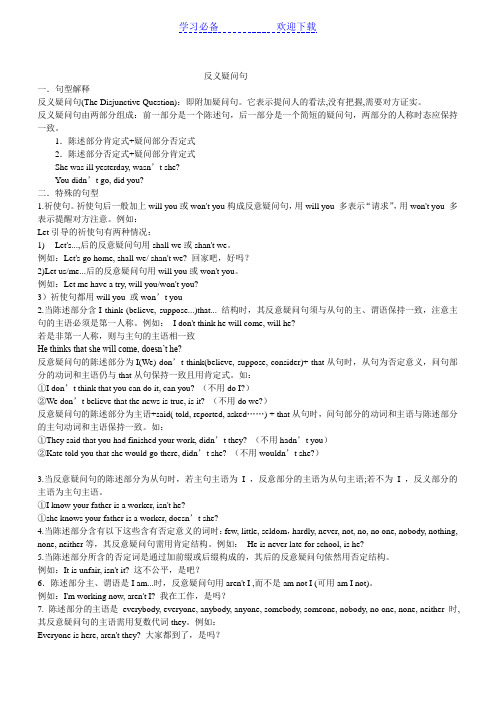
反义疑问句一.句型解释反义疑问句(The Disjunctive Question):即附加疑问句。
它表示提问人的看法,没有把握,需要对方证实。
反义疑问句由两部分组成:前一部分是一个陈述句,后一部分是一个简短的疑问句,两部分的人称时态应保持一致。
1.陈述部分肯定式+疑问部分否定式2.陈述部分否定式+疑问部分肯定式She was ill yesterday, wasn’t she?You didn’t go, did you?二.特殊的句型1.祈使句。
祈使句后一般加上will you或won't you构成反意疑问句,用will you 多表示“请求”,用won't you 多表示提醒对方注意。
例如:Let引导的祈使句有两种情况:1) Let's...,后的反意疑问句用shall we或shan't we。
例如:Let's go home, shall we/ shan't we? 回家吧,好吗?2)Let us/me...后的反意疑问句用will you或won't you。
例如:Let me have a try, will you/won't you?3)祈使句都用will you 或won’t you2.当陈述部分含I think (believe, suppose...)that... 结构时,其反意疑问句须与从句的主、谓语保持一致,注意主句的主语必须是第一人称。
例如:I don't think he will come, will he?若是非第一人称,则与主句的主语相一致He thinks that she will come, doesn’t he?反意疑问句的陈述部分为I(We) don’t think(believe, suppose, consider)+ that从句时,从句为否定意义,问句部分的动词和主语仍与that从句保持一致且用肯定式。
反义疑问句的用法知识讲解
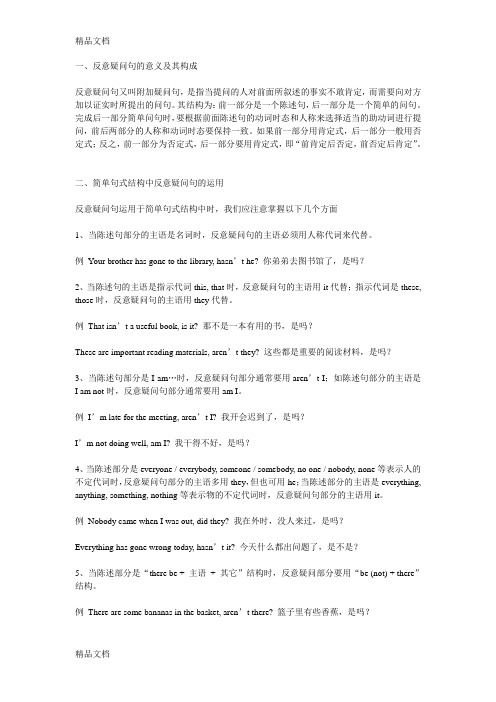
一、反意疑问句的意义及其构成反意疑问句又叫附加疑问句,是指当提问的人对前面所叙述的事实不敢肯定,而需要向对方加以证实时所提出的问句。
其结构为:前一部分是一个陈述句,后一部分是一个简单的问句。
完成后一部分简单问句时,要根据前面陈述句的动词时态和人称来选择适当的助动词进行提问,前后两部分的人称和动词时态要保持一致。
如果前一部分用肯定式,后一部分一般用否定式;反之,前一部分为否定式,后一部分要用肯定式,即“前肯定后否定,前否定后肯定”。
二、简单句式结构中反意疑问句的运用反意疑问句运用于简单句式结构中时,我们应注意掌握以下几个方面1、当陈述句部分的主语是名词时,反意疑问句的主语必须用人称代词来代替。
例Your brother has gone to the library, hasn’t he? 你弟弟去图书馆了,是吗?2、当陈述句的主语是指示代词this, that时,反意疑问句的主语用it代替;指示代词是these, those时,反意疑问句的主语用they代替。
例That isn’t a useful book, is it? 那不是一本有用的书,是吗?These are important reading materials, aren’t they? 这些都是重要的阅读材料,是吗?3、当陈述句部分是I am…时,反意疑问句部分通常要用aren’t I;如陈述句部分的主语是I am not时,反意疑问句部分通常要用am I。
例I’m late for the meeting, aren’t I? 我开会迟到了,是吗?I’m not doing well, am I? 我干得不好,是吗?4、当陈述部分是everyone / everybody, someone / somebody, no one / nobody, none等表示人的不定代词时,反意疑问句部分的主语多用they,但也可用he;当陈述部分的主语是everything, anything, something, nothing等表示物的不定代词时,反意疑问句部分的主语用it。
反义疑问句讲解及答案

反义疑问句一.句型解释反义疑问句(The Disjunctive Question):即附加疑问句。
它表示提问人的看法,没有把握,需要对方证实。
反义疑问句由两部分组成:前一部分是一个陈述句,后一部分是一个简短的疑问句,两部分的人称时态应保持一致。
1.陈述部分肯定式+疑问部分否定式2.陈述部分否定式+疑问部分肯定式She was ill yesterday, wasn’t she?You didn’t go, did you?二.特殊的句型1.祈使句。
祈使句后一般加上will you或won't you构成反意疑问句,用will you 多表示“请求”,用won't you 多表示提醒对方注意。
例如:Let引导的祈使句有两种情况:1) Let's...,后的反意疑问句用shall we或shan't we。
例如:Let's go home, shall we/ shan't we? 回家吧,好吗?2)Let us/me...后的反意疑问句用will you或won't you。
例如:Let me have a try, will you/won't you?3)祈使句都用will you 或won’t you2.当陈述部分含I think (believe, suppose...)that... 结构时,其反意疑问句须与从句的主、谓语保持一致,注意主句的主语必须是第一人称。
例如:I don't think he will come, will he?若是非第一人称,则与主句的主语相一致He thinks that she will come, doesn’t he?反意疑问句的陈述部分为I(We) don’t think(believe, suppose, consider)+ that从句时,从句为否定意义,问句部分的动词和主语仍与that从句保持一致且用肯定式。
(完整版)英语语法:反义疑问句专项讲解.doc

(完整版)英语语法:反义疑问句专项讲解.doc反义疑问句一、反义疑问句又叫附加疑问句。
反义疑问句由两部分组成:前一部分是一个陈述句,后一部分是一个简短的疑问句,两部分的人称时态应保持一致。
1.陈述部分为肯定式 + 疑问部分为否定式(如果陈述部分的否定词带有否定前缀,那么,该陈述部分作肯定处理,附加疑问部分一般仍用否定形式)e.g. She was ill yesterday, wasn’ t she?Tom dislikes the book, doesn’ t he?2. 陈述部分为否定式+ 疑问部分为肯定式(陈述部分用no, nothing, nobody, never, few, seldom, hardly, rarely, little等否定或半否定含义的词时,疑问部分用肯定式。
)e.g. He can ’ t ride a bike, can he?Some plants never blown ( 开花 ), do they ?二、附加疑问句(一)主语的选择1.陈述部分的主语是I ,疑问部分要用aren't I.I ’ m as tall as your sister, aren't I?注:当陈述部分的主语是I,而句子又用来征询对方的意见时,附加疑问句中的主语用you。
如:I find English very interesting, don’t you?I don ’t like that film, do you?2.当陈述部分的主语是everybody, everyone, someone, nobody, no one, somebody 等合成代词时,附加疑问句中的主语通常用they,亦可用 he,如:Somebody phoned while I was out, didn’t they?Everyone enjoyed the party, didn’t they?Nobody wants to go there, does he?3.当陈述部分的主语是不定代词everything, nothing, anything, something时,附加疑问句中的主语一般用it ,如:Everything seems all right now, doesn’t it?Nothing is kept in good order, is it?Something must be done to stop pollution, isn’t it?4.当陈述部分的主语是指示代词this, that 或 these, those 时,附加疑问句中的主语分别用it 和 they,如:This is important, isn’t it?That isn ’t correct, is it?These are your friends Tom and Jack, aren’t they?5.如果陈述部分是以代词one 作主语,附加疑问句中的主语在正式场合用one,非正式场合下可以用you 或 he,如:One can’t be too careful, can one?或 can you?One should do his duty, shouldn’t he?16.当陈述句为there be 结构时,附加疑问句中的主语也用there。
(完整版)反义疑问句详细讲解及习题及答案
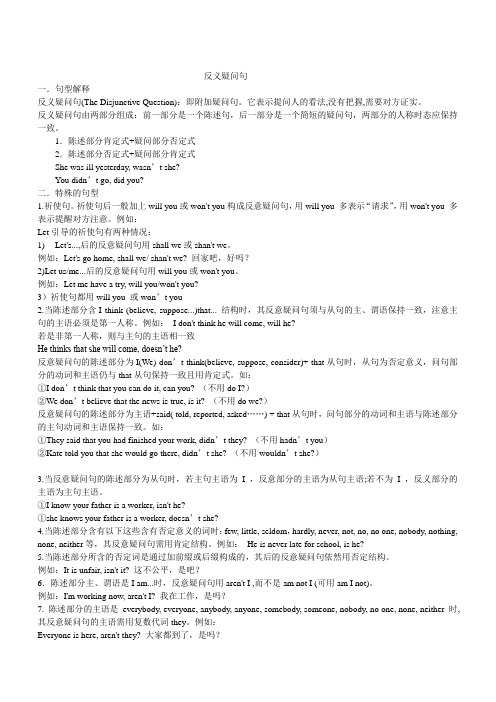
反义疑问句一.句型解释反义疑问句(The Disjunctive Question):即附加疑问句。
它表示提问人的看法,没有把握,需要对方证实。
反义疑问句由两部分组成:前一部分是一个陈述句,后一部分是一个简短的疑问句,两部分的人称时态应保持一致。
1.陈述部分肯定式+疑问部分否定式2.陈述部分否定式+疑问部分肯定式She was ill yesterday, wasn’t she?You didn’t go, did you?二.特殊的句型1.祈使句。
祈使句后一般加上will you或won't you构成反意疑问句,用will you 多表示“请求”,用won't you 多表示提醒对方注意。
例如:Let引导的祈使句有两种情况:1) Let's...,后的反意疑问句用shall we或shan't we。
例如:Let's go home, shall we/ shan't we? 回家吧,好吗?2)Let us/me...后的反意疑问句用will you或won't you。
例如:Let me have a try, will you/won't you?3)祈使句都用will you 或won’t you2.当陈述部分含I think (believe, suppose...)that... 结构时,其反意疑问句须与从句的主、谓语保持一致,注意主句的主语必须是第一人称。
例如:I don't think he will come, will he?若是非第一人称,则与主句的主语相一致He thinks that she will come, doesn’t he?反意疑问句的陈述部分为I(We) don’t think(believe, suppose, consider)+ that从句时,从句为否定意义,问句部分的动词和主语仍与that从句保持一致且用肯定式。
反义疑问句超详细讲解!!!
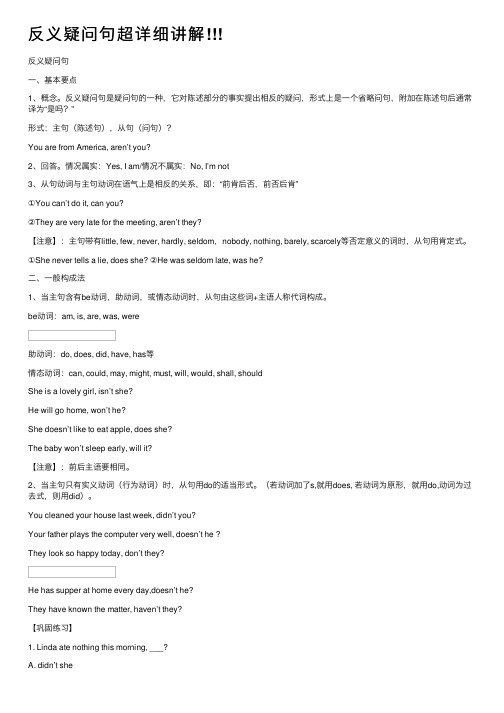
反义疑问句超详细讲解反义疑问句⼀、基本要点1、概念。
反义疑问句是疑问句的⼀种,它对陈述部分的事实提出相反的疑问,形式上是⼀个省略问句,附加在陈述句后通常译为“是吗?”形式:主句(陈述句),从句(问句)?You are from America, aren’t you?2、回答。
情况属实:Yes, I am/情况不属实:No, I’m not3、从句动词与主句动词在语⽓上是相反的关系,即:“前肯后否,前否后肯”①You can’t do it, can you?②They are very late for the meeting, aren’t they?【注意】:主句带有little, few, never, hardly, seldom,nobody, nothing, barely, scarcely等否定意义的词时,从句⽤肯定式。
①She never tells a lie, does she? ②He was seldom late, was he?⼆、⼀般构成法1、当主句含有be动词,助动词,或情态动词时,从句由这些词+主语⼈称代词构成。
be动词:am, is, are, was, were助动词:do, does, did, have, has等情态动词:can, could, may, might, must, will, would, shall, shouldShe is a lovely girl, isn’t she?He will go home, won’t he?She doesn’t like to eat apple, does she?The baby won’t sleep early, will it?【注意】:前后主语要相同。
2、当主句只有实义动词(⾏为动词)时,从句⽤do的适当形式。
(若动词加了s,就⽤does, 若动词为原形,就⽤do,动词为过去式,则⽤did)。
反意疑问句语法讲解

反意疑问句语法讲解首先大家要了解什么是反意疑问句,它主要是表达什么的?陈述部分和疑问部分要么前肯后否,要么前否后肯。
这类句子有时带有感情色彩,表示惊奇,愤怒,讽刺,不服气等。
例如:You call this a day's work,don't you?你说这就叫一天的活儿,不是吗?由此大家可以看出,这类句型和它的名字一样,是表示反问别人的,带有很浓的感情色彩。
一般来说都会在选择题中考察大家,有些时候也会在完形填空中考察。
下面就是针对不同情况的反义疑问句的讲解:一、当陈述部分是祈使句时:1、肯定祈使句时,疑问部分用will you 或者won’t you..Close the door, will you / won’t you?2、否定祈使句时,只用will you.3、以let’s 开头的祈使句用shall we.4、以let us 开头的祈使句用will you.5、以let me 开头的用may I / will you.二、当陈述部分为并列句时,附近疑问句应采用就近原则,与最后一个分句相一致。
I help Lucy with her Chin ese ,and she helps me with my English, doesn’t she?三、当陈述部分为主从复合句时:1、疑问部分须与主句保持一致:He says his mother didn’t feel well, doesn’t he?2、当陈述部分是I think I believe I guess 等主句后跟that 从句时(主句的主语必须是I)疑问部分应和从句保持一致,并且要注意否定的转移:I believe he will pass the exam, won’t he?I don’t think he will pass the exam, will he?四、部分特殊简单句的反意疑问句:1、陈述部分是I am 时,后面用aren’t I.2、陈述部分含有否定前、后缀构成的词时,作肯定句处理,疑问部分用否定:Tom is unhappy today, isn’t he? She is careless ,isn’t she?3、陈述部分含有never nothing hardly neither little few no nobody none too…to…no one 等表示否定意义的词时,疑问部分用肯定形式:She has no money to pay for it, does she ?4、以there 开头的陈述句有两种情况:(1)、there be 句型时,疑问部分的主语用there,There are some books on the table, aren’t there?( 2)、当以表示“地点”的there 引导时,要用陈述句真实主语的相应代词形式作疑问部分的主语,常有这两个句型:There live……There stand……There stand two trees on the hill, don’t they? There lived a poor old man in the woods, didn’t he?5、陈述部分出现had better 句式时,后面仍用had 构成疑问部分。
专四语法第14节-反意疑问句

专四语法第14节-反意疑问句专四语言知识之反意疑问句一、知识要点反意疑问句也叫附加疑问句 ( Tag Question ),主要由“陈述部分+附加疑问部分”构成。
(一) 疑问部分的主语附加疑问部分的主语通常和陈述部分的主语一致,但需注意下列情况:1. 陈述部分的主语是 everything, something, nothing 等指物的合成词时,附加疑问部分的主语用it; 当陈述部分的主语是everyone, everybody, somebody, someone, nobody, no one 等指人的合成词时,由于这些词未指明性别,因而附加疑问句部分的主语也应用未指明姓名的they。
Everything is arranged in a good order, isn’t it 一切都安排得井井有条,是不是Someone has broken the glass, haven’t they 有人打碎了杯子,是吗No one knows the history of this museum, do they 没有人知道这座博物馆的历史,是吗2. 当陈述部分是there be 句式,附加疑问部分的主语也用there。
There’s something wrong, isn’t they 出错了,是吗3. 当陈述部分的主语是不定式,动名词,从句或this/that 时,疑问部分的主语通常用it。
Seeing is believing, isn’t it 眼见为实,不是吗This is not as beautiful as that, is it4. 当陈述部分的主语是不定代词one时,疑问部分的主语可以用one (正式场合),也可以用you (非正式场合)。
One can not survive without water, can you /one 人没有水就无法生存,是不是5. 当陈述部分是主从复合句,附加疑问句部分一般应与主句的主语和谓语一致;但是,当陈述部分的主句是第一人称主语+think, believe, suppose, suspect, expect等结构时,附加疑问部分往往与宾语从句中的主语和谓语动词保持对应关系,但要注意否定的转移。
专四辅导 反义疑问句的讲解和解释
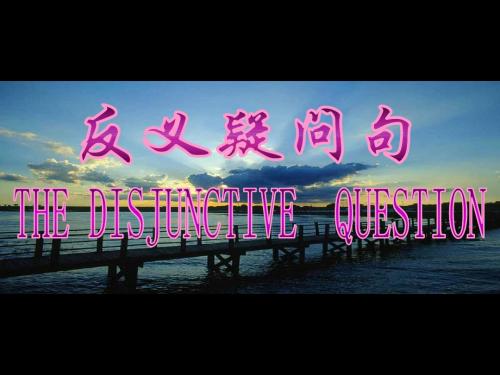
2.陈述部分否定式 + 疑问部分 肯定式 You didn’t go, did you? He can’t ride a bike, can he?
请注意以下句型的反义疑 问句的用法:
1)陈述部分的主语是I,疑问部 分要用 aren't I. I‘m as tall as your sister, aren't I?
Nobody will go, will they?
16)带情态动词dare或need的反 意疑问句,疑问部分常用 need (dare ) +主语。
We need not do it again, need we ? He dare not say so, dare you?
当dare, need 为实义动词时, 疑问部分用助动词 do + 主语。 She doesn't dare to go home alone, does she?
4)含有ought to 的反意疑问句, 陈述部分是肯定的,疑问部分 用shouldn't / oughtn't +主语。 He ought to know what to do, oughtn't he? / shouldn't he?
5)陈述部分有 have to + v. (had to + v.),疑问部分常用don't + 主语(didn't +主语)。
He is not the man who gave us a talk, is he? He said he wanted to visit Japan, didn't he?
c. 上述部分主句谓语是I /we think, believe, expect, suppose, imagine 等引导的宾语从句,疑 问部分与宾语从句相对应构成反 意疑问句。
反义疑问句最全讲解
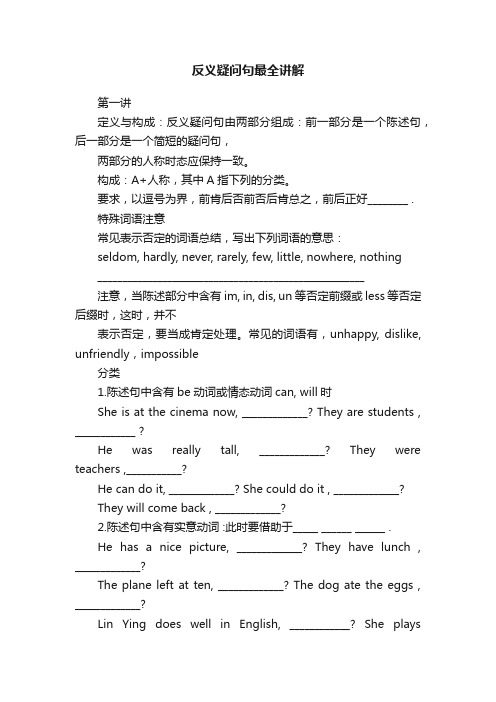
反义疑问句最全讲解第一讲定义与构成:反义疑问句由两部分组成:前一部分是一个陈述句,后一部分是一个简短的疑问句,两部分的人称时态应保持一致。
构成:A+人称,其中A指下列的分类。
要求,以逗号为界,前肯后否前否后肯总之,前后正好________ .特殊词语注意常见表示否定的词语总结,写出下列词语的意思:seldom, hardly, never, rarely, few, little, nowhere, nothing_____________________________________________________注意,当陈述部分中含有im, in, dis, un等否定前缀或less等否定后缀时,这时,并不表示否定,要当成肯定处理。
常见的词语有,unhappy, dislike, unfriendly,impossible分类1.陈述句中含有be动词或情态动词can, will时She is at the cinema now, _____________? They are students , ____________ ?He was really tall, _____________? They were teachers ,___________?He can do it, _____________? She could do it , _____________?They will come back , _____________?2.陈述句中含有实意动词 :此时要借助于_____ ______ ______ .He has a nice picture, _____________? They have lunch , _____________?The plane left at ten, _____________? The dog ate the eggs , _____________?Lin Ying does well in English, ____________? She playsbasketball, _____________?3.陈述句是there be 句型,构成为 _____________There is a ball in his hand, __________? There is little ink in the pen, __________?There are ten boys here, _________? There was a book on the desk, ___________?There were three boys palying football here ,__________?4.不定代词做陈述句主语,常用的不定代词表示人的有: everybody, everyone, someone, no one, nobody, somebody表示物的有:everything, anything, nothing, something当主语是表示人的不定代词时,反义疑问句部分的主语用_______ ,有时候也用he .当主语是表示物的不定代词时,反义疑问句部分的主语用_______ .Everything is ready, _______? Somebody borrowed my pen yesterday,_____?Somebody came here just now, ________? Nothing is wrong with the machine, ________?Nobody is waiting for you, _____________? Everything is OK, ______________?5.指示代词做陈述句主语单数this/ that _____________复数these/ those _____________These aren’t your b ook, _____________?This is a lovely city, _____________?练习1:变反义疑问句1.The boys are swimming in the river, _______?2.Mike can’t play the piano, _____________?3.The girl usually gets up early in the morning, _______?4.He wasn’t born in Wuhan, _____________?6.Jean and Kate are never late for school, __________?7.This is your bike, _____________?8.Those are American apples, _____________?9.He had to stay at home last Sunday, ________?10.You bought a new computer last week, ____?11.He hardly ever goes shopping, __________?12.The visitors are from the USA, ___________?13.Jim doesn’t like oranges, _____________?14.His mother went to work at half past seven this morning, ___________?15.They can’t mend the computer, __________?16.You are unhappy, ___________?17.They have never been to France, __________ ?18.She was watching TV at that time, _________?19.Bill enjoys ice skating very much, _________________?20.Their prices are really low, ___________?21.They won’t come back in a week, _________________?22.The pen is yours, _________23.Lucy likes English, ___________?24.That wasn’t a wonderful night, ______________?25.Your sister helped him, ______________?26.Tony is talking to his mother, ____________?27.Your brother can’t swim, _______________?28.We have to finish it before the teacher come back, _____?29.The workers had to take the first bus, ____________?30.The boys are swimming in the river, ______?31.Mike can’t play the piano, _____________?32.The girl usually gets up early in the morning, _______?33.He wasn’t born in Wuhan, _____________?35.Jean and Kate are never late for school, __________?36.This is your bike, _____________?37.Those are American apples, _____________?38.He had to stay at home last Sunday, ________?39.You bought a new computer last week, ____?40.He hardly ever goes shopping, __________?42.Jim doesn’t like oranges, _____________?43.His mother went to work at half past seven this morning, ___________?44.They can’t mend the computer, __________?45.You are unhappy, ___________?46.They have never been to France, __________ ?47.She was watching TV at that time, _________?练习2:选择1. Everything seems all right, _____ ?A. does itB. don’t theyC. won’t itD. doesn’t it2. He has never ridden a horse before, ___?A. does heB. has heC. hasn’t heD. doesn’t he3. Linda ate nothing this morning, ___?A. didn’t sheB. was sheC. did sheD. wasn’t she4. They cut the trees , _____?(A) don't they (B) didn't they (C) did they (D) do they5. His sister had a bad cough, ________ she?(A) wasn't (B) doesn't (C) hadn't ( D) didn't6. John can hardly understand any Chinese, _______ he?(A) can't (B) doesn't (C) can (D) does7. They could hardly believe the news, _____?A. couldn’t theyB. could theyC. did theyD. didn’t they第二讲6.祈使句一:一个特殊情况Let’s →shall we ? 其余都用______ ?不论肯定与否定。
反义疑问句的用法归纳及回答

反义疑问句的用法归纳及回答【反义疑问句】(一)概念:反意疑问句是由陈述句和附在其后的附加疑问句组成。
其中附加疑问句是对陈述句所说的事实或观点提出疑问,起证实作用,一般用于证实说话者所说的事实或观点。
(二)要点注意:1、反意疑问句前后两部分谓语应是:“肯定陈述+否定疑问”或“否定陈述+肯定疑问”。
2、简略问句如果是否定式:not应与be,do,will等系动词、助动词、情态动词缩写。
3、简略问句的主语不用名词,应用人称代词。
4、陈述部分含“too...to”时,是否定句。
(三)用法:1) 陈述部分I am时,疑问部分要用aren't I.I'm as tall as your sister,aren't I?(我和你姐姐一样高,对吗?)2) 陈述部分用no, nothing, nobody, never, few, little, seldom, hardly等否定含义的词时,疑问部分用肯定含义。
如:The old man made no answer, did he?Jim is never late for school, is he?3) 陈述部分有情态动词have to +v. (had to + v.),疑问部分常用don't +主语(didn't +主语)。
We have to get there at eight tomorrow, don't we?used to,疑问部分用didn't +主语或usedn't +主语。
He used to take pictures there, didn't he? / usedn't he?had better(最好)+ v. 疑问句部分用hadn't you?You'd better read it by yourself, hadn't you?4) 陈述部分有would rather(宁可、宁愿)+v.,疑问部分多用wouldn't +主语。
反义疑问句知识点总结
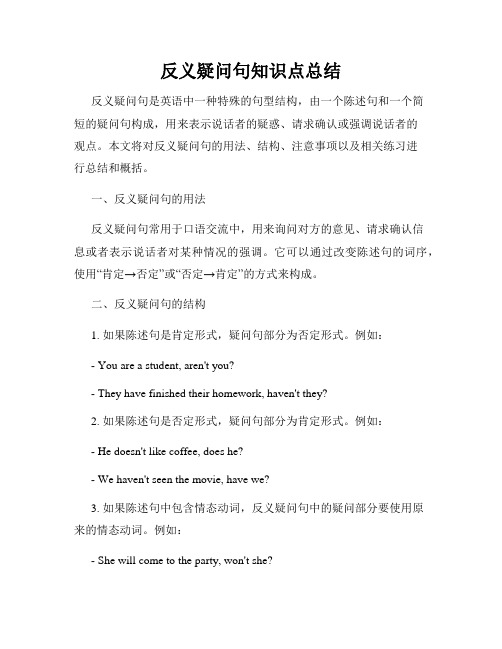
反义疑问句知识点总结反义疑问句是英语中一种特殊的句型结构,由一个陈述句和一个简短的疑问句构成,用来表示说话者的疑惑、请求确认或强调说话者的观点。
本文将对反义疑问句的用法、结构、注意事项以及相关练习进行总结和概括。
一、反义疑问句的用法反义疑问句常用于口语交流中,用来询问对方的意见、请求确认信息或者表示说话者对某种情况的强调。
它可以通过改变陈述句的词序,使用“肯定→否定”或“否定→肯定”的方式来构成。
二、反义疑问句的结构1. 如果陈述句是肯定形式,疑问句部分为否定形式。
例如:- You are a student, aren't you?- They have finished their homework, haven't they?2. 如果陈述句是否定形式,疑问句部分为肯定形式。
例如:- He doesn't like coffee, does he?- We haven't seen the movie, have we?3. 如果陈述句中包含情态动词,反义疑问句中的疑问部分要使用原来的情态动词。
例如:- She will come to the party, won't she?- They can swim, can't they?4. 如果陈述句中使用了“let's”来表示建议,反义疑问句中疑问部分要使用“shall we”。
例如:- Let's go for a walk, shall we?5. 如果陈述句中使用了“there is”或“there are”,反义疑问句中疑问部分要使用“isn't there”或“aren't there”。
例如:- There is a book on the table, isn't there?三、注意事项1. 反义疑问句的结构要与陈述句的主语保持一致。
- She is a doctor, isn't she?(正确)- She is a doctor, aren't you?(错误)2. 主语如果是第三人称单数,疑问句的代词要使用对应的第三人称代词,即“he、she、it”。
英语反义疑问句的问句与回答归纳

英语反义疑问句用法讲解一、基本概念及结构:反义疑问句又叫附加疑问句,是指当提问的人对前面所叙述的事实不敢肯定,而需要向对方加以证实时所提出的问句。
其结构为:前一部分是一个陈述句,后一部分是一个简短的问句。
完成后一部分简短问句时,要根据前面陈述句的动词时态和人称来选择适当的助动词进行提问,前后两部分的人称和动词时态要保持一致。
如果前一部分用肯定式,后一部分一般用否定式;反之,前一部分为否定式,后一部分要用肯定式,即“前肯定后否定,前否定后肯定”。
例如:You don’t like rock music, do you? 你不喜欢摇滚乐,对吧?二、反义疑问句的回答不管是前否后肯,还是前肯后否形式的反义疑问句,回答都根据事实回答,肯定的答案就用yes+肯定结构,否定的答案就用no+否定结构,答案要和实际情况相符。
也叫实事求是例如:1、--She is good at English, isn't she?--Yes, she is. 是的,她擅长或者No, she isn't.不,她不擅长2、--There isn't a computer in you r room, is there?“你的房间里没有电脑,对吗? -- Yes, there is.不,有电脑或者 No,there isn't.是的,没有电脑。
三、其他规则:1、陈述部分用否定词或半否定词 no , nothing, nobody, never, few, seldom, hardly, rarely, little 等否定含义的词时,疑问部分用肯定形式。
例如:He is never late for school, is he?他上学从不迟到,是吗?2、陈述部分的谓语是used to 时,疑问部分用didn’t +主语或 usedn’t +主语。
例如:He used to take pictures there, didn’t / usedn’t he? 他过去常常在那儿拍照,是吗?You used to sleep with the windows open, usedn’t/ didn’t you?你过去常常开着窗户睡觉,是吗?3、陈述部分为祈使句时,祈使句后加附加问句,不表示反意,而表示一种语气。
- 1、下载文档前请自行甄别文档内容的完整性,平台不提供额外的编辑、内容补充、找答案等附加服务。
- 2、"仅部分预览"的文档,不可在线预览部分如存在完整性等问题,可反馈申请退款(可完整预览的文档不适用该条件!)。
- 3、如文档侵犯您的权益,请联系客服反馈,我们会尽快为您处理(人工客服工作时间:9:00-18:30)。
应注意的问题
14.当陈述部分是祈使句时,反意疑问部分常用 will you. 如: ①Help me to do it, will you? ②Don’t go there, will you? ③Be quiet, will you? ④Give me some cigarettes, will you? ⑤Don’t move the chair, will you?
应注意的问题
18. must/ may/ can’t + have done +过去时间状语,表 示对过去情况的推测,反意疑问部分常用一般过去 时。如: ①He must have stayed at home yesterday, didn’t he? (相当于: I think he stayed at home yesterday.) ②You must have seen the film last week, didn’t you? (相当于:I think you saw the film last week.) ③It can’t have snowed last week, did it? (相当于:I don’t think it snowed last week.) ④He may have gone home last night, didn’t he? (相当于:Maybe he went home last night.)
反意疑问句
反意疑问句
1. 结构情况 2. 答语 3. 注意的问题
应注意的问题
1. ⒈当陈述部分的主语是everybody, everyone, someone, no one, nobody, somebody等不定 代词时,反意疑问句部分中的主语常用they (有时也可用he.)如: ①Nobody phoned while I was out, did they? ②Everyone has been there, haven’t they? ③Somebody borrowed my pen yesterday, didn’t they? ④No one was hurt, was he?
应注意的问题
18. must/ may/ can’t + have done , 反意疑问部分常用现 在完成时。如: ①You must have met him before, haven’t you? (相当于:I think you have met him before.) ②You may have been to Tibet, haven’t you? (相当于:Maybe you have been to Tibet.) ③He can’t have known the news, has he? (相当于:I don’t think he has known the news.) ④You must have waited for a long time, haven’t you? (相当于:I think you have waited for a long time.)
应注意的问题
2. 当陈述部分的主语是everything, anything, nothing, something等表物的不定代词时,反 意疑问部分的主语常用it.如: ① Everything has been done on how to prevent the pollution, hasn’t it? ②Nothing is wrong with the machine, is it? ③Nothing can stop us now, can it?
应注意的问题
7.当陈述部分中含有im, in, dis, un等否定前缀或less等否 定后缀时,应把陈述部分看成是肯定的,反意疑问 部分要用否定式。如: ①He was unsuccessful, wasn’t he? ②This meeting is unimportant, isn’t it? ③Your mother dislikes seeing you with me, doesn’t she? ④He is unfamiliar with this type of computer, isn’t he?
应注意的问题
15.当陈述句部分含had better/best, would like to, would rather等约定俗成特殊短语时,反意疑 问部分应保留第一个词。如: ①He had better do more speaking, hadn’t he? ②You would like to do it, wouldn’t you?
应注意的问题
6.当陈述部分含有seldom, hardly, never, rarely, few, little, nowhere, nothing等否定词或半否定词时,反 意疑问部分的动词应用肯定形式。如: ①She seldom goes to the cinema, does she? She ②Few people know him, do they? ③Bob rarely got drunk, did he? ④He has never been to London, has he? ⑤They can hardly understand it, can they? ⑥You have nothing else to say, have you?
应注意的问题
3.当陈述部分的主语是one时,反意疑问部分的主 语常用one或you。如: ①One can’t be too careful, can one/ you? ②One should study hard, shouldn’t one/ you?
应注意的问题
4. 当陈述部分的主语是man(人类)时,反意疑问 部分的主语常用he。如: Man is the master of his own fate, isn’t he?
应注意的问题
13.当陈述部分含有情态动词used to时,反意疑 问部分可用used to形式或did形式。如: ①He used to smoke three cigarettes a day, didn’t/ usedn’t he? ②He used to get up late, didn’t/ usedn’t he? ③We used to work in the same workshop, didn’t/ usedn’t we?
应注意的问题
5.当陈述部分是there be结构时, 反意疑问部分 用there,省略主语代词。 ①There is something wrong with the machine, is there? ②There won’t be any trouble, will there? ③There used to be a shop, didn’t there?
应注意的问题
8.当陈述部分是I’m …结构时,反意疑问部分常用 aren’t I 如: ①I am late, aren’t I? ②I’m a boy, aren’t I?
应注意的问题
9. 当陈述部分是主从复合句时,反意疑问部分中的动词 和主语代词通常应和主句中的动词和主语保持一致。 如: ①She says that I did it, doesn’t she? ②He never said he would come, did he? ③When he goes there, he will go to see her, won’t he? ④If you don’t start early, you will be late, won’t you? ⑤He told you that he had watched the football match, didn’t he? ⑥Peter believes that his dream will come true some day, doesn’t he?
应注意的问题
10.当陈述部分的主句是I suppose, I think, I believe, I imagine等结构时,反意疑问部分往往与从句保持一 致,而且要注意否定转移。如: ①I suppose that she is careful, isn t she? I isn’t ②I think he is a thief, isn’t he? ③I don’t believe she has gone home, has she? ④I don’t think he can do it well, can he? ⑤I don’t believe you can finish the job, can you? ⑥I don’t guess he knows it, does he?
应注意的问题
注:Let’s 和Let us都表示“让我们”,但用法上不同。 前者包括听话人,后者不包括听话人。正因如此, 它们的反意疑问句的形式常常不同: 以Let’s 开头的祈使句,反意疑问部分常用shall we. 以Let us开头的祈使句,反意疑问部分常用will you. 如: ①Let’s go skating, shall we? ②Let us have a look at your book, will you? ③Let’s go now, shall we? ④Let us go shopping, will you?
应注意的问题Байду номын сангаас
12.当陈述部分的谓语动词包括have to, had to时, 反意疑问部分通常用do的适当形式。如: ①You had to take the early bus, didn’t you? ②We have to do it, don’t we? ③He has to look after the child, doesn’t he? ④They had to keep quiet, didn’t they?
